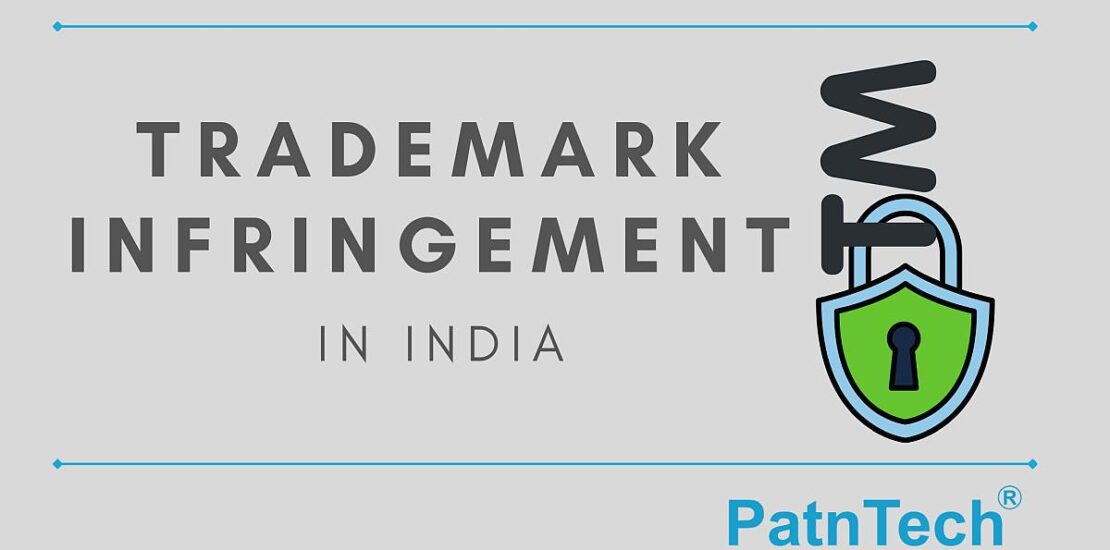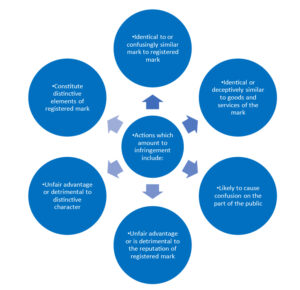- January 28, 2021
- Posted by: Patntech
- Categories: International, Trademark

Trademark infringement is the unauthorized use of a trademark or service mark on or in connection with goods/services in a manner that is likely to cause confusion, deception, or mistake about the source of the goods and/or services.
Trademark infringement may occur when one party, the “infringer”, uses a trademark which is identical or confusingly similar to a trademark owned by another party, in relation to products or services which are identical or similar to the products or services which the registration covers.
In India, the registration of trademark under the Act provides the owner an exclusive right to use the mark in respect to the goods and/or services. The action of infringement can be imposed only when the trademark is registered with the Trademark Registry.
The following essential conditions should have taken place on part of the infringer to start an infringement action against them while using the registered mark in due course of trade:
 Under the Trade Mark Act, even oral use of the mark can constitute infringement. The unauthorised use of mark for advertisement of the registered trademark if that takes unfair advantage of and is contrary to the honest practices in industrial or commercial matters. The advertising is detrimental to its distinctive character and thus advertisement is against the reputation of the trade mark amounts to infringement of the registered mark.
Under the Trade Mark Act, even oral use of the mark can constitute infringement. The unauthorised use of mark for advertisement of the registered trademark if that takes unfair advantage of and is contrary to the honest practices in industrial or commercial matters. The advertising is detrimental to its distinctive character and thus advertisement is against the reputation of the trade mark amounts to infringement of the registered mark.
The MAAZA war is significant case which threw light on the rights and ownership of trademark owner. In cursory glance, here the Bisleri International Pvt. Ltd, defendant was the owner of the trademark “MAAZA” which eventually sold its IP Protection to the Coco Cola Company. Subsequently, the defendant filed registration for the same trademark in Turkey and started exporting. The court held that exporting of goods from a country is considered as sale within the country from where the goods are exported and the same amounts to infringement of trademark. Court granted an interim injunction against defendant from using the mark in India as well as for export market.
The trademark owner can take protective/preventive measures to avoid infringement by others. This helps to deter future litigation expenses and oppositions. Preventive measures taken by Adidas is a classic example. Adidas, (designer and manufacturer of sport shoes, clothing and accessories) challenged a trademark registration filing from Turner, owners of ELEAGUE, an official worldwide esports league, for its logo image. The image contained three strips similar to Adidas. Though Adidas did not operate in esports it took the prevent measure arguing that they could naturally step into it in coming future.
The likelihood of confusion was addressed in the landmark judgement in IPR is Yahoo Inc. vs Akash Arora 78 (1999) DLT 285, the defendant adopted the domain name “Yahooindia.com” and got the same registered in his name. The plaintiff was the owner of the trademark “Yahoo” and the domain name “Yahoo.com”. As the word in question “Yahoo” had already acquired the distinctiveness and was associated with the business of plaintiff, the court granted in favour of plaintiff an injunction restraining the defendant from using the impugned mark. It was from then; the domain names attained the weightage as a trademark. It was the first decision for the protection of Intellectual property right on the internet and a landmark judgement on cybersquatting.
Though there are strong precedents, the IPR law is volatile. Similarities of marks is gauged by the courts and the discretion lies with the court. Recent case of “Covishield”, Cutis Biotech, which claimed it had the trademark and authority of the tradename “COVI SHIELD”. Cutis Biotech approached the court seeking temporary injunction to restrain Serum Institute of India (SII) from committing act of passing off of the trademark. Also, to restrain the use of trademark “Covishield” by SII. The plea was rejected on the grounds that, the Cutis Biotech could not prove prima facie of the case and triple test of the passing off a trademark i.e., the goodwill of the plaintiff, damages to the plaintiff, and misrepresentation made by the defendant.
The probability of confusion is the top-notch component of infringement action. The consequences can fall overnight like it happened between two financial e-payment giants, Paypal and Paytm. The contention by Paypal is that the mark “Paytm” is deceptively and confusingly similar to the logo of Paypal. The name starting with “Pay” will lead to “a likelihood of confusion” and the combination of colours in the logo (light blue and dark blue). The case was filed in the Indian Trade Mark Registry in the year 2016 and the case still seems to be on going.
Interestingly in a recent judgement, the infringement case of the trademark “coronil” filed by Arudra Engineers Pvt Ltd against Patanjali Ayurveda addressed as to trademark should be taken as a whole likewise registered and not parts of it for infringement suit. The outcome of the case was that “the registration of a trademark does not confer any exclusive right/monopoly over a part of the trademark so registered”. The Arudra Engineers Pvt Ltd had applied for the trademarks “Coronil 92B” and “Coronil 213 SPL” and claimed the trademark rights for the whole of the label marks comprising of common word “Coronil” and the alpha numerals namely “92B” and “213 SPL”. On the other hand, Patanjali had applied for the trademark “Coronil Tablet” under a different class of trademark which is opposed for similar infringing trademark.
The court held that, when each part is capable of being individually registered, the court cannot dissect and split up the trademark into its components and grant an injunction. In this case, the registration of the labels by Arudra did not confer any exclusive rights over the word “coronil”. When taken as a whole the trademark “Coronil Tablet” is different from “Coronil 92B” or “Coronil 213SPL” and have distinguishable different features to the marks.
In consideration of all facts, the bench was of the view that there cannot be monopoly over the parts of trademarks that is registered. Thus, it was concluded that the injunction along with fine passed by single judge should be set aside and the matter to be disposed in a time-bound manner by the Commercial Division of the High Court.
The trademark infringement is dealt under the Section 29 of the Trade Marks Act, 1999. In this Section the infringement is amounted to direct infringement. In India, there is another aspect to trademark infringement i.e., indirect infringement.
The indirect infringement is a common law principle which are the unwritten laws based on legal precedents established by the court. The law holds it accountable not only the direct infringers but also the people who induce the direct infringers to commit the infringement. They are also known as the contributory infringement and vicarious liability (Section 114 of Trade Marks Act, 1999).
The indirect infringement occurs when a person, though not directly, but causes another person to infringe on a trademark. In either case of infringement, the onus of proof lies upon the owner of the trademark or the plaint who is seeking the remedy. The statutory provision with regard to filing an infringement suit is provided under Section 134 of the Trade Marks Act, 1999. If the owner becomes successful in proving the case then he is entitled for civil remedies, criminal remedies and administrative remedies. The remedies collectively include the following:
- Injunctions;
- Restriction on use of mark in future;
- Damages or accounts of profits;
- Seizure and confiscation of infringing goods by the police department;
- Arrest of infringers;
- Fines and penalties.
- Opposing the registration of deceptively similar trademark through Trade Mark Journal publication.
The punishment under criminal proceedings includes, imprisonment for a period not less than six months that may extent to three years and a fine that is not less than ₹50,000 which may extend to ₹2 lakhs.
The Trade Mark Act only extends protection to trademarks that have been registered with the trademark registry of India. In the case of alleged infringement of an unregistered mark, the common law of passing off can be used to settle disputes. In other words, owner of the trademark can commence proceedings under the common law for passing off or misrepresentation. Over the years, the concept of passing off has widened to matters of unfair trade and unfair competitions where one person’s activities harm the goodwill associated with the activities of another person or group of individuals.
In case of infringement / passing off trademark, a criminal complaint can be filed. It is interesting to note that under the Provisions of the Trade Marks Act, 1999, the offences under the Act are Cognizable, meaning that the police can register an FIR (First Information Report) and prosecute the offenders directly.
Author: Sneha V Kopparad
What is an invention disclosure form?
An invention disclosure form (IDF) is a document that inventor(s) use to disclose their invention to their organization or a research institution. In case the inventors are working with a Patent Agent or Attorney, then the inventors disclose their invention to the Patent Agent or Attorney. The IDF typically includes information about the inventor(s), a
January 24, 2023HOW TO SELECT A GOOD TRADEMARK?
Selecting a good trademark is an important step in protecting your brand and building a strong reputation for your business. Here are a few tips on how to select a good trademark: Make it unique and Distinct: Your trademark should be unique and distinct from any other existing trademarks, so it can be easily identified
January 20, 2023Intellectual property (IP) protection for Social Media Influencers and Content Creators
Intellectual property (IP) protection is an important issue for social media influencers and content creators as they often rely on their creative works to generate income and build their personal brand. Many a times, the social media influencers and content creators post content without properly registering their creative work. Register IP can benefit in following
January 20, 2023Latest Trademark Cases
June 10, 2021




